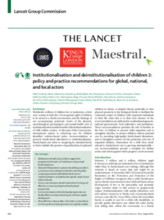Displaying 141 - 150 of 691
In this commentary piece for The Lancet Psychiatry, Joan Kaufman highlights some key findings and recommendations from the Lancet Group Commission on the institutionalisation and deinstitutionalisation of children.
In this second part of the Lancet Group Commission on institutionalisation and deinstitutionalisation of children, international experts in reforming care for children identify evidence-based policy recommendations to promote family-based alternatives to institutionalisation.
In this commentary piece, Anne Longfield, Children’s Commissioner for England, explores the use of children's care homes in England and the need for improved supports to prevent placement in children's home and to provide for the needs of children and young people who are placed in these homes.
This Lancet Group Commission, published between The Lancet Child & Adolescent Health and The Lancet Psychiatry, advocates global reform of the care of separated children through the progressive replacement of institutional provision with safe and nurturing family-based care.
In this webinar, a panel including persons with disabilities and experts in disaster management, human rights and service provision discuss the need for “emergency deinstitutionalisation” of persons with disabilities and how this could be achieved.
This article describes a policy adoption case study about deinstitutionalization of childcare in Georgia since independence. It highlights the evolving and non-homogeneous nature of transnational agency in the area of childcare deinstitutionalization, and offers insights into the complex relationship between transnational agency and national policymaking.
This guidance from Miracle Foundation outlines case management process and tools aimed at children in Child Care Institutions (CCIs) in India who have been placed with their families during the COVID-19 pandemic. The purpose of these case management processes and tools is to determine feasibility of permanent placement and expedite family-based care in families in which children were placed quickly and without proper preparation during COVID-19 lockdown.
This article compares how the global policy of deinstitutionalisation (DI) of child welfare travelled, was translated and institutionalised in two post-Soviet countries – Russia and Kazakhstan.
The Organizational Governance and Accountability Checklist is designed to help determine whether an organisation providing residential care services, and the principal donor (where the principal donor represents an entity), have sufficient governance and accountability structures in place to mitigate, manage and address risks or issues that may arise in the course of transitioning the model of care.
This animated video from Alternative Care Thailand tells the story of a boy in Thailand who is sent to live in an orphanage because his mother feels she is unable to care for him at home, his experiences with volunteers once he arrives at the orphanage, and how the orphanage transitioned to supporting children to live in families.




